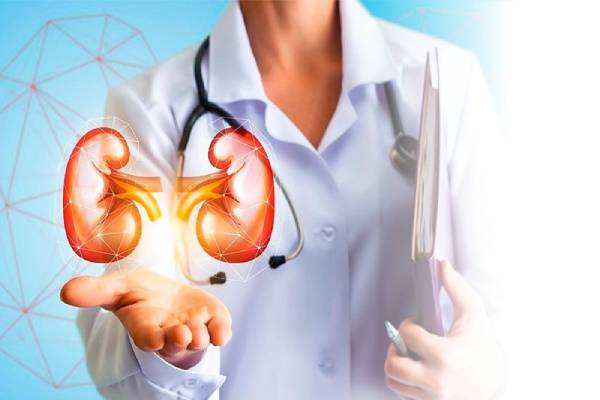Table of Contents
A kidney transplant is surgery to get a healthy kidney from a living or dead donor and place it in the body of a person whose kidneys are no longer working properly. The kidneys are two bean-shaped organs located on each side of the spine, just below the chest. Each is about the size of a fist.
Their main task is to purify and remove waste, minerals, and fluids from blood and urine production. When your kidneys lose this filtration capability, the level of harmful fluid and waste in your body increases and accumulate, which can increase your blood pressure and lead to kidney failure (the final stage of kidney disease).
The final stage of kidney disease occurs when the kidneys have lost about 90% of their ability to function normally. In the continuation of this article, we will examine the process of kidney transplantation by Moj Aramesh Amitis Health Tourism Company.

Common Causes of Kidney Disease:
- Diabetes
- Chronic and uncontrolled blood pressure
- Chronic glomerulonephritis- inflammation and final and small ulcers in the kidneys (glomerular)
- Polycystic kidney disease
People in the final stages of kidney disease can remove waste products from their bloodstream through dialysis or a kidney transplant.
Why is it done?
Kidney transplantation is often a good treatment for renal failure compared to permanent dialysis. Kidney transplantation can treat chronic kidney disease or end-stage kidney disease to help you feel better and live longer.
Advantages of kidney transplantation over dialysis
- Better quality of life
- Less risk of death
- Less dietary restrictions
- Lower treatment costs
Some people may benefit from kidney transplant surgery before the need for dialysis, a method that is used as a definitive treatment for kidney failure. But for some people with kidney failure, a kidney transplant may be more dangerous than dialysis.
The conditions that may cause people not eligible for a kidney transplant to include:
- Old age
- Severe heart disease
- Active or recently treated cancer
- Dementia or poorly controlled mental illness
- Alcohol or drug abuse
- Any other factor that can affect the safe performing of this procedure and taking the medications needed after kidney transplantation to prevent organ rejection.
If a person has lost both kidneys, only one donated kidney is needed to replace two disabled kidneys.
How is a kidney transplant performed?
In this article from Moj Aramesh Amitis Health Tourism Company, we have examined everything you need to know before, during, and after kidney transplant surgery.
How to be prepared for kidney transplantation?
Once you realize you need kidney transplant surgery, you need to take the following steps.
- Choosing kidney transplant center
If a specialist recommends kidney transplantation treatment, you will be referred to a kidney transplant center. You can also choose a kidney transplant center on your own or choose a center from your insurance company’s list of preferred providers.
When considering kidney transplant centers, you may want to:
o Get acquainted with the number and type of transplants performed by the center each year.
Ask about the survival rate of a kidney transplant at a kidney transplant center.
o Compare kidney transplant center statistics through a database maintained at the kidney transplant recipient center.
Find out if this center offers the necessary conditions for a kidney transplant.
Know the costs you will incur before, during, and after a kidney transplant. Costs include testing, kidney donation from the donor, surgeon costs, hospitalization, and transportation to a designated center for a kidney transplant and subsequent appointments.
o Other services provided by the kidney transplant center, such as support groups, seek the necessary coordination to follow up on your recovery at home.
Check the center’s commitment to complying with the latest technology and techniques in the world of kidney transplantation, which shows that this collection is in progress.
- Evaluation for kidney transplantation
After choosing a kidney transplant center, you will be evaluated to see if you have the necessary conditions for a kidney transplant.
- Kidney Transplant Center Team
Evaluation is done by the Kidney Transplant Center to find out:
ü are healthy enough to have surgery and take lifelong medications after a kidney transplant.
ü do you have specific medical conditions that affect the treatment and surgery of kidney transplantation?
ü you wish and can take medications according to the guidelines and follow the recommendations of the kidney transplant team.
The evaluation process may take several days and includes:
- A fully physical examination
- Imaging studies such as X-rays, MRI or CT scans
- Blood tests
- Psychological assessment
- Any other necessary tests determined by your doctor.
After your evaluation, the kidney transplant team will share the results with you and tell you if you have been accepted as a kidney transplant candidate. Each transplant center has all its criteria. If you are not accepted to a kidney transplant center, you will be able to apply through other centers.
Expectations of kidney transplant surgery
Cases that can be expected from kidney transplant surgery will be expressed as kidney transplant procedures, i.e. before, during, and after surgery.
- Before kidney transplantation
A kidney donor can be alive or deceased, be family or stranger to you. The kidney transplant team will consider several factors when evaluating whether a donor’s kidney is right for you.
Tests to determine whether a donated kidney is suitable for you include:
- Blood group matching: The kidney transplant center prefers to receive a kidney from a donor whose blood type matches the patient and is compatible. Incompatible with blood group transplantation is also possible, but before and after kidney transplantation requires special medical treatment to reduce the risk of organ rejection. These are known as incompatible kidney transplants (ABO).
- Body tissue matching: If your blood group is compatible with a kidney donor, the next step is to test the type of tissue of the patient and the donor called human leukocyte antigen type (HLA). The test compares genetic markers that increase the likelihood of long-term durability of transplantation. A good match means that your body is less likely to reject a donated kidney.
The third and final matching experiment involves merging a small sample of your blood with the donor’s blood in the lab. This test determines whether antibodies in your blood react to specific antigens in the donor’s blood.
A negative test means that the patient’s blood is compatible with the donor and the patient’s body is not likely to reject the donor’s kidney. Kidney transplantation is also possible in case of a mismatch but requires special medical treatment before and after kidney transplantation to reduce the risk of transplantation.
Other factors that the kidney transplant team will consider to find the most suitable donor kidney for you include age, kidney size, and exposure to infection. If you are waiting for a kidney donation or your kidney transplant surgery is already planned, try again for your health.
Being healthy and active as much as you can, can most likely help you get ready for kidney transplant surgery. It may also help accelerate your recovery after surgery.
To maintain your health until a kidney transplant, you must:
- Take your medication as prescribed.
- Follow your diet and exercise guidelines.
- Do not smoke, consult your doctor if you need to quit smoking.
- All appointments with your health care team go regularly.
- Engage in healthy activities such as resting and spending time with family and friends.
Get in touch with your kidney transplant team and let them know about important changes in your health. If you’re waiting for a donated kidney, make sure the kidney transplant team knows how to always look after you.
- During kidney transplantation
Kidney transplantation is performed with general anesthesia. So you’re not awake during the operation. The surgical team monitors your heart rate, blood pressure, and oxygen levels during the operation. The surgeon will make an incision on the underside of one side of your abdomen and place a new kidney in your body. New kidney blood vessels are attached to the blood vessels in the lower abdomen, just above one of your legs. The new kidney rub (a tube that connects the kidney to the bladder) is attached to your bladder.
- After Kidney Transplantation
Spend a few days to a week in the hospital. Doctors and nurses will monitor your condition at the kidney transplant site at the hospital to quickly look for signs of possible complications and take action. Your new kidneys, like the previous ones, will function when they are healthy.
Most of the procedure starts immediately after the surgery. In other cases, it may take a few days and you may need temporary dialysis so that your new kidneys start working properly. Expect pain around the incision site when you recover.
Most kidney transplant recipients can return to work and other normal activities within eight weeks of having a kidney transplant. Do not lift any heavy weights or do any exercise other than slow walking until the wound has healed (usually about six weeks after surgery).
Do frequent checkups as you continue to recover. After leaving the hospital, careful monitoring is required for a few weeks to check how your new kidney works and make sure your body doesn’t rule it out.
You may need a blood test several times a week and adjust your medication in the weeks following a kidney transplant. During this time, if you live in another city, you may need to make arrangements to stay near a kidney transplant center so that you can contact your kidney transplant center immediately if a problem arises.
After kidney transplantation, you will take some medications for the rest of your life. Immunosuppressive drugs (anti-rejection drugs) help prevent attacks and excrete new kidneys in your immune system. Prescribed medications help reduce the risk of other complications, such as infection, after transplantation.
Result of Kidney Transplant
The new kidney filters your blood and you will no longer need dialysis. To prevent kidney excretion, your body needs medications that suppress your immune system. Because these anti-rejection drugs make you more vulnerable to infection, your doctor may also prescribe antibacterial, antiviral, and antifungal medications.
It is important to take all your medicines as prescribed by your doctor. If you stop taking your medication, even for a short time, your body may reject the new kidney. Contact your kidney transplant team immediately if you experience any side effects due to medication prescribed by your doctor.

Kidney Transplant in Iran
You may be looking for a safe country for kidney transplant surgery that, while high-quality work, has a reasonable cost, Iran will be the best choice for you. Iranian surgeons are very skilled in performing kidney transplant surgery. In addition to being highly skilled, these surgeons also have well-equipped clinics, clinics, and hospitals.
Based on the explanations given, you may think that performing kidney transplant surgery in Iran will cost a lot of money, but we must say that the cost you have to pay is much less than the cost that you have to pay in a country like the United States.
Many hospitals in Iran can perform kidney transplant surgery with incredible speed and quality. Therefore, kidney transplant surgery in Iran will surely have your desired results.
Author: Sh. Khazaei
Translator: N. Rahimifar




